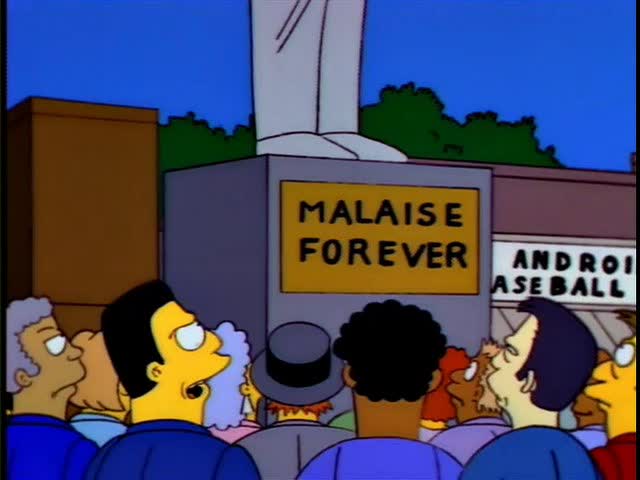That '70s Show

Hat tip to James Kirkpatrick for the apposite Simpsons still.
Chaos In The Mideast, Gas Lines At Home
In our last post (Shades Of 2000 And 2008), we wrote about two observers of the current scene who saw parallels to the spring of 2000 and the summer of 2008, respectively. We'll be checking in again with one of those observers below, but it occurs to us that one could draw another historical analogy here: the 1970s. The '70s famously featured chaos in the Middle East, from the Arab-Israeli War in 1973 to the Iran hostage crisis later in the decade as well as gas lines in the U.S. due to the OPEC boycott.
Mideast (and Midwest) Chaos
This week, we've had Israelis and Palestinians fighting it out with everything from rocks,
#TelAviv
— The Daily Sneed ™ ➐ (@Tr00peRR) May 11, 2021
pic.twitter.com/gTa5LJN12v
to rockets.
53 seconds in. A Hamas rocket just obliterated a bus and this dude is just sitting there eating a sandwich like it’s a normal day. pic.twitter.com/DxENo61dor
— Caleb Hull (@CalebJHull) May 11, 2021
Meanwhile, supporters of both sides clashed in New York City,
"Pro-Israel and Pro-Palestine crowd clashes in New York" -- via https://t.co/YvJhhS0ZxF pic.twitter.com/eMkgg0zMHF
— crabcrawler (@crabcrawler1) May 11, 2021
And supporters of one side marched in the Midwest of all places, in Minneapolis.
NOW - Pro-Palestine protesters march in #Minneapolis, Minnesota.pic.twitter.com/pTTLoy2v3X
— Disclose.tv 🚨 (@disclosetv) May 11, 2021
Pipeline Problems
At the same time, thanks to a ransomware attack on the Colonial Pipeline, parts of America's east coast were plagued by gas shortages.
Someone should ask @PressSec why Colonial is a good pipeline and Keystone XL was bad.https://t.co/oMWtVpd8Xi
— David Pinsen (@dpinsen) May 12, 2021
As of midnight, Patrick De Haan of Gas Buddy reported that nearly 1,800 gas stations in the Southeast were out of gas.
Amongst AL, GA, FL, SC, NC, MD and VA, nearly 1,800 stations are currently out of gasoline.
— Patrick De Haan ⛽️📊 (@GasBuddyGuy) May 12, 2021
Perhaps because it didn't support the narrative of America improving under its new management, national media didn't spend too much time talking about these shortages.
This is so bizarre. I’ve called 10 gas stations around Asheville and not a single one has gas. One person laughed at me when I asked. And yet nothing on current gas shortages on NPR and most other national news sites. How is this not the biggest story in the US right now???
— Katie Herzog (@kittypurrzog) May 11, 2021
Entrepreneur, investor, and crypto advocate Balaji Srinivasan saw the pipeline problem as another failure of American elites.
No, idiot, the contempt is for what American elites are wreaking on the world. From surveillance to invasions, from pandemic to inflation, the US is no longer the guarantor of any kind of world order.https://t.co/KSMFlyHZu4
— balajis.com (@balajis) May 11, 2021
Up until he decamped recently for Singapore and India, one would have thought Srinivasan was an American elite himself. Readers may recall that the former Andreessen Horowitz partner was mooted as a candidate for FDA chairman last year.
Objections To The 1970s Comparison
At this point, we can imagine some readers objecting to our 1970s comparison. What about all the tech innovation going on today, you might ask. There was innovation in the 1970s too. Microsoft, Apple, and Genentech were all founded in the '70s.
We can also imagine some pointing out that Joe Biden is no Jimmy Carter. This is true. Jimmy Carter was a fairly vigorous 53-year-old in his first year in the White House; Joe Biden, in contrast is a somewhat less-spry 78.
And while Carter presided over the Camp David peace treaty between Israel and Egypt, Biden has so far presided over a deterioration in Arab (Palestinian)-Israeli relations. In this sense, our current situation may be worse. While President Biden has been notably absent from Twitter, he appears to be notably absent from much else too, as Ed Asante pithily suggested.
Chaotic tweeting is better than a chaotic world.
— EdAsante (@EdAsante77) May 12, 2021
Checking In Again With "The Flaming Eyeball"
In our previous post we included an observation passed along by "The Flaming Eyeball" that the current economic environment echoed the summer of 2008 with respect to gas prices and intimations of impending doom. Here he offers another astute observation, that the lack of a strong figure in the White House to offer cogent reassurances may make the current chaos worse.
— The Flaming Eyeball (@EyeballFlaming) May 12, 2021
Time To Play Defense
We mentioned one way of playing defense in our previous post: hedging against market risk. In the video below, we present a demonstration of that, for an investor whose portfolio is closely correlated with the Nasdaq. The basic idea is to use the Nasdaq-tracking Invesco QQQ ETF (QQQ) as a proxy, and then to scan for the optimal put options given your risk tolerance on an appropriate dollar amount of shares.
Video Length: 00:05:24
In that portfolio, we used our iPhone app to scan for optimal puts on QQQ, but if you don't have an iPhone, our website offers that capability as well.
Disclaimer: The Portfolio Armor system is a potentially useful tool but like all tools, it is not designed to replace the services of a licensed financial advisor or your own independent ...
more


